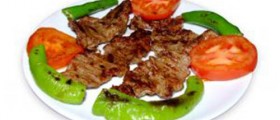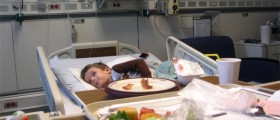
In allergies people become extremely sensitive to certain substances. The response of the body towards the allergen is abnormal and is caused by improper and over-exaggerated reaction of the immune system.
Once a person is exposed to an allergen the body's hypersensitive immune system recognizes the substance as foreign and harmful. What follows is production of antibodies and chemicals which are supposed to destroy 'foreign' particles. These foreign particles are generally harmless but in hypersensitive individuals they may trigger an abnormal reaction with severe symptoms and signs. In extreme cases allergic reaction may be in a form of anaphylaxis, a serious and potentially life-threatening condition.
People may become allergic to different allergens. Food allergies are only one type of allergies. In food allergies people become allergic to a particular food product.
Food Allergies in Infants
Food allergies in infants and children are relatively frequent. They generally develop within the first three years of a child's life. This can be easily explained by immaturity of both, the immune system and gastrointestinal system. This is why a child must be gradually introduced certain food and specific foods are strictly limited until the certain age. For example highly allergic foods such as strawberries are not supposed to be introduced into an infant's diet until the child turns one. There are several more rules that refer to specific foods. Many infants and older children develop food allergy to cow's milk, eggs, berries, peanut, soy etc.
Presentation of Common Food Allergies in Infants
In food allergies the body produces immunoglobulin E (IgE). This antibody allows release of histamines and are highly effective in triggering allergic reactions. In majority of infants food allergies are in a form of hives although they may also cause respiratory and gastrointestinal problems.
The skin changes develop in a form of skin rash and hives or eczema. These changes develop soon after the particular food has been consumed. Respiratory symptoms include stuffy or runny nose, breathing difficulties, wheezing, asthma-like symptoms. Some patients may suffer from watery and red eyes and some have gastrointestinal problems such as nausea, vomiting, diarrhea or constipation. The most serious form of allergy is anaphylaxis.
Treatment and Prevention of Food Allergies in Infants
Once the allergy is confirmed a child is suppose to stay away from the potential allergen. To prevent the occurrence of allergy parents should stick to doctor's advice and introduce specific foods to a child's diet gradually. In case allergy occurs it is treated with suitable medications such as glucocorticosteroids.

















Your thoughts on this
Loading...